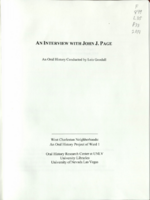Search the Special Collections and Archives Portal
Search Results

Transcript of interview with Adele Baratz by Steve McClenachan, March 3-4, 1979
Date
Archival Collection
Description
Interview with Adele Baratz by Steve McClenachan on March 3 and 4, 1979. In this interview, Baratz talks about growing up in Las Vegas and her her schooling. She graduated from Las Vegas High School in 1944, and discusses the rationing that took place during World War II. She went to Maryland for nursing school and returned to Las Vegas in 1947. She describes some of the hotels and casinos, and tells the story of her father trading property for an automobile in 1935. She also recalls the building of Hoover Dam, swimming in local pools, and going to Mount Charleston in the winter. The interviewer asks her about travel between Las Vegas and California and the impact of Atlantic City on Las Vegas tourism. Baratz then talks about her nursing career and starting a re-certification program in 1974 and the different hospitals in the area.
Text

Transcript of interview with Harry Sax by Barbara Tabach, April 8, 2015
Date
Archival Collection
Description
Interview with Harry Sax by Barbara Tabach on April 8, 2015. In this interview, Sax discusses his family history and upbringing in Chicago, and his military service in Munich. He returned to Chicago and became business partners with Michael Schulson, with whom he opened several Arby's outposts, and expanded to Las Vegas in 1968. He talks about life in Las Vegas in the 1970s and the competition in the fast food industry. He then talks about the reform congregation in Chicago and his connection to Judaism throughout his life. He describes himself as a "closet Jew" before becoming president at Congregation Ner Tamid in 2007. Sax discusses the programs at Ner Tamid for all ages, and his continued involvement in the community.
In 1939, Harry Sax was born in Chicago, Illinois, the son to first generation American Jews. He spent his childhood on Chicago's South, where his family belonged to a progressive Reform congregation. After graduating from Hyde Park High School, he continued his education at Indiana University. In college, Harry was a member of the ZBT Jewish fraternity, participated in a singing group, and was a cadet in the Reserve Officers' Training Corps. Upon graduating from college, Harry was stationed in Munich, Germany as a second lieutenant in the Quartermasters Corps. In addition to his required military duties, he also participated in an after-hours acting group; through this group, he was hired as an extra and for small roles, including The Great Escape. When he finished his service, Harry returned to Chicago, where he connected with a high school friend, Mike Schulson. The two became partners and purchased Arby's franchises in Chicago and Las Vegas. Thus, in 1968, while his partner remained in Chicago, Harry moved to Las Vegas and opened two franchise locations in two weeks. Though it took a few years to stabilize the business and overcome competition, he opened a third location in 1972 on South Decatur, what was then the western edge of the city. Today, Harry has nineteen locations in Las Vegas, with additional franchises in Reno and Barstow, California, and employs nearly 300 people. After about twenty years as a "closet Jew" in the city, Harry reconnected with Judaism and joined Congregation Ner Tamid in the late 1990s. He served on its board, eventually becoming vice president and then president (2007-09). He also dedicated himself to have a bar mitzvah, following up on his Jewish education and confirmation as a teenager. Harry has also served on the Anti-Defamation League's board as well as an active member of the Chamber of Commerce.
Text

Transcript of interview with Phyllis Friedman by Barbara Tabach, March 2, 2015
Date
Archival Collection
Description
In this interview, Phyllis Friedman reflects upon her extensive work with the ADL in Las Vegas. She discusses the city?s relatively low anti-Semitic activity, and how this allowed the Las Vegas ADL office to focus its efforts more broadly than in other cities. She also touches upon her family history, and how the community of Las Vegas has evolved since first visiting in 1963.
A Chicago native, Phyllis Friedman first came to Las Vegas in 1996 to become the Jewish Federation of Las Vegas? first foundation director. After two years, Friedman moved to year Los Angeles to work for ORT. Itching to get back to Las Vegas, in 2007, Friedman returned to the city to became director of the Nevada regional office of the Anti-Defamation League (ADL). In this position, she worked with schools as well as law enforcement, including the Federal Bureau of Investigation (FBI), teaching about tolerance and justice. She is a recipient of the FBI?s Las Vegas Division Director?s Community Leadership Award as well as the first awardee of Jewish Federation?s Jewish Professional of the Year. Three weeks into retirement, Friedman gave this interview, reflecting upon her extensive work with the ADL in Las Vegas. She discusses the city?s relatively low anti-Semitic activity, and how this allowed the Las Vegas ADL office to focus its efforts more broadly than in other cities. She also touches upon her family history, and how the community of Las Vegas has evolved since first visiting in 1963.
Text

Transcript of interview with Michael S. Mack by Barbara Tabach, May 20, 2015
Date
Archival Collection
Description
In this oral history Michael Mack discusses his early memories of Las Vegas such as attending the Fifth Street School and activities him and his friends participated in. The interview also includes his memories of different members of the Mack family and their activities. He reminisces about his many visits to the Flamingo Hotel as well as being taken by his parent to floor shows. He also discusses what it was like to grow up Jewish in Las Vegas and the way Jews helped build the community.
Text

Transcript of interview with Toshiyuki "George" Goto by Christina Oda, February 26, 1979
Date
Archival Collection
Description
On February 26, 1979, Christina Oda interviewed Toshiyuki “George” Goto (born 1922 in Huntington Beach, California) about his life in Nevada. Goto first talks about his move to Nevada in 1951 before talking about his family, church activities, politics, and recreational activities. He then discusses the building, economic, and environmental changes in Las Vegas. Goto later talks in depth about his profession in landscaping, including the work he completed for some of the hotels and resorts built on the Las Vegas Strip. The latter part of the interview includes discussion about Goto’s Japanese ancestry and his perceptions as a minority when first moving to and living in Las Vegas. The interview’s conclusion covers the topics of social activities and Goto’s organization of a local chapter of the Japanese American Citizens League.
Text

Transcript of interview with Ruth Hazard by John Neal, March 8, 1975
Date
Archival Collection
Description
On March 8, 1975, John Neal interviews Ruth Hazard (birthdate unknown, 67 years old) in her home about her memory of how Southern Nevada has changed economically. Hazard goes in-depth about her knowledge of municipal politics and her husband’s friendships with a number of Nevadan politicians. Hazard also briefly talks about her fascination with the above-ground atomic tests, speakeasies during Prohibition, and local anxieties about Las Vegas “losing its identity.”
Text

Transcript of interview with John Page by Lois Goodall, April 16, 2014
Date
Archival Collection
Description
John J. Page attended 13 schools before graduating from high school in the Ozark Hill Country of Oklahoma. Although he engaged in no combat, he was drafted into military after completing two years of college at the University of Oklahoma in Norman, Oklahoma. After his discharge from the U.S. Air Force, he helped his wife, Reitha, finish the credits she needed to complete her degree, and he then worked to complete his in Norman. Following his graduation, the couple relocated to Las Vegas in February 1959, when Reitha found a job at Washington Elementary School. In Las Vegas John completed his practice teaching under master teacher Lamar Terry at Twin Lakes Elementary School and under supervision of Dr. Holbert Hendrix at the University of Nevada, Las Vegas. John held his first teaching assignment, fifth grade at West Charleston Elementary School (later called Howard Wasden Elementary School), for 27 years before transferring with his principal to Helen Marie Smith Elementary School. For a time John and Reitha rented a small house at the comer of Bonanza Road and First Street that was owned by entertainer Horace Heidt. They bought their first house, a Pardee Park Home one block north of Tom Williams Elementary School in North Las Vegas, because Reitha taught there, and she and the children could walk to school together. In 1973 they bought their current house on El Cortez Avenue in the Westleigh tract. Page not only worked in Ward 1 for 27 years of his 36-year teaching career (1959-1995); he and his family also lived in Ward 1 for more than forty years. As a teacher in the school that served the wealthiest Las Vegas families, Page witnessed the many ways that generous donations of time, money, and talent matter to schools, students, and teachers. As an early resident of Westleigh tract, Page saw dramatic changes to the area's built environment. And as a longtime educator, Page observed several cycles of experimental instmctional techniques and philosophies.
Text

Transcript of interview with Ann Lynch by Emily Powers, May 27, 2008
Date
Archival Collection
Description
Ann Lynch discusses her background - born in Kansas City, 1934; attended Baker University in Baldwin, Kansas; classes at Kansas University; a year in theater; director of PR at Evansville University. In 1959 she came to Las Vegas as director of the clubs at Nellis Air Force Base. Ann shares in depth on her parents and grandparents and on her family today, which includes a brother 14 years younger, her son, and a nephew. She describes Las Vegas in the early sixties, meeting her husband, and her duties as club manager at Nellis. She comments on becoming camp director for the Girl Scout program at Mount Charleston, which led to training scout leaders and board members. When Ann's son Edward went to kindergarten, she took on the PTA job of parliamentarian, then president of Ruth Fyfe ES PTA. She eventually became President of the Las Vegas Area Council, Nevada State PTA president, and finally national president of the PTA. The school named after her (Ann T. Lynch Elementary) has benefited from her other charity organizations. Because of her PTA involvement, Ann became very active in legislation in Washington, D.C., traveling to other countries to help activate parent involvement. She had also worked with Sunrise Hospital during this time and when she was relieved of some of her PTA duties, she helped found the Sunrise Hospital Children's Foundation and the Public Education Foundation. She details the many functions of both foundations. Ann comments on the lobbying she does in the Nevada legislature and in Washington, D.C., medical billing through Medicare and Medicaid, and the ongoing shortage of nurses nationwide. She offers opinions on unions for nurses and mentions robotic surgery, the stroke center, neonatal center, and breast cancer center as evidence of recent developments in medicine at Sunrise Hospital.
Text

Interview with Cecil C. Garland, July 19, 2006
Date
Archival Collection
Description
Text

Interview with Laurie Joe (L. Joe) Deal, September 27, 2005
Date
Archival Collection
Description
Text
